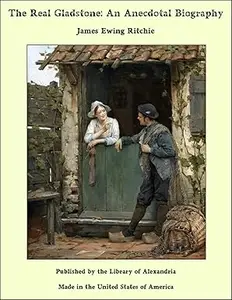
Free Download James Ewing Ritchie, "The Real Gladstone: An Anecdotal Biography"
English | 2020 | ASIN: B08KTTFJGZ | EPUB | pages: 257 | 1.2 mb
Many, many years ago England's foremost statesman, as George Canning then was, distrusted by the multitude, feared by his colleagues, regarded with suspicion by the First Gentleman of the Age-as it was the fashion to term George the Magnificent, who was then seated on the British throne-wearied of the strife and turmoil of party, spent a short time at Seaforth House, bidding what he deemed his farewell to his Liverpool correspondents. His custom, we are told, was to sit for hours gazing on the wide expanse of waters before him. His had been a marvellous career. Born out of the circle of the ruling classes, by his indomitable energy, the greatness of his intellectual gifts, his brilliant eloquence, he had lifted himself up above his contemporaries, and had become their leader; and here he was about to quit the scene of his triumphs-to reign as Viceroy in a far-off land. Canning, however, did not retire from the Parliamentary arena, but stopped at home to be Premier of Great Britain and Ireland, and to let all Europe know that this country had done with the Holy Alliance; that a new and better spirit was walking the earth; that the dark night of bigotry was past, and that the dawn of a better day had come. As he sat there looking out over the waters, a little one was to be seen playing below upon the sand. That little lad was the son of Canning's host and friend, and his name was William Ewart Gladstone. Does it not seem as if the little one playing on the sand had unconsciously caught something of the genius, of the individuality, of the eloquence, of the loftiness of aim, of the statesman who sat above him overlooking the sea? Circumstances have much to do with the formation of character. To the youthful Gladstone, Canning was a light, a glory, and a star. William Ewart Gladstone was born on December 29, 1809, at a house which may still be seen, 62, Rodney Street, Liverpool. He was of Scotch extraction, his father, a Liverpool merchant, having an estate in Scotland. Mr. Gladstone senior lived to become one of the merchant princes of Great Britain, a Baronet, and a Member of Parliament. He died, at the advanced age of eighty-seven, in 1851. His wife was Anne, daughter of Andrew Robertson, of Stornoway. They had six children; William Ewart Gladstone was the third. The family were all brought up as debaters. The children and their parents are said to have argued upon everything. They would debate whether the meat should be boiled or broiled, whether a window should be shut or opened, and whether it was likely to be fine or wet next day. As a little boy, Gladstone went to school at Seaforth, where the late Dean Stanley was a pupil. The latter is responsible for the following: 'There is a small school near Liverpool at which Mr. Gladstone was brought up before he went to Eton. A few years ago, another little boy who was sent to this school, and whose name I will not mention, called upon the old clergyman who was the headmaster. The boy was now a young man, and he said to the old clergyman: "There is one thing in which I have never in the least degree improved since I was at school-the casting up of figures." "Well," replied the master, "it is very extraordinary that it should be so, because certainly no one could be a more incapable arithmetician at school than you were; but I will tell you a curious thing. When Mr. Gladstone was at the school, he was just as incapable at addition and subtraction as you were; now you see what he has become-he is one of the greatest of our financiers."'
The Real Gladstone An Anecdotal Biography Torrent Download , The Real Gladstone An Anecdotal Biography Watch Free Link , The Real Gladstone An Anecdotal Biography Read Free Online , The Real Gladstone An Anecdotal Biography Download Online
